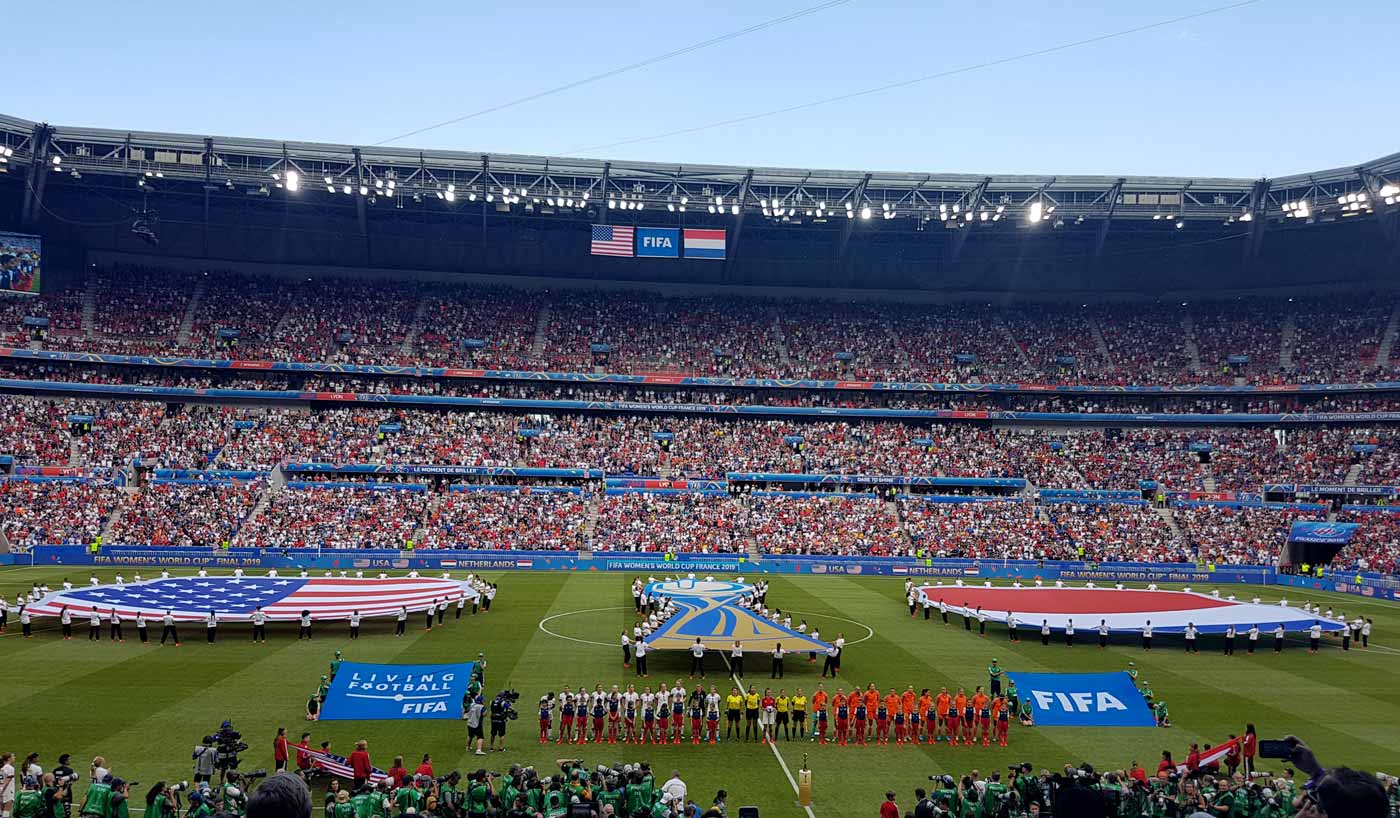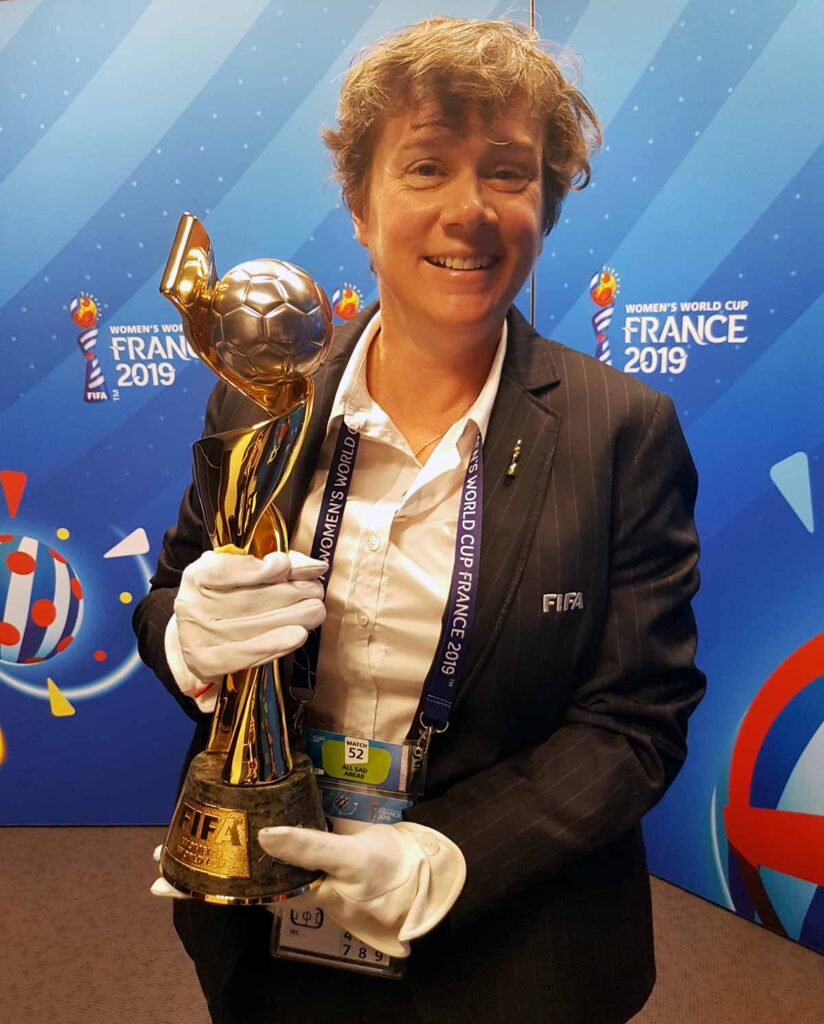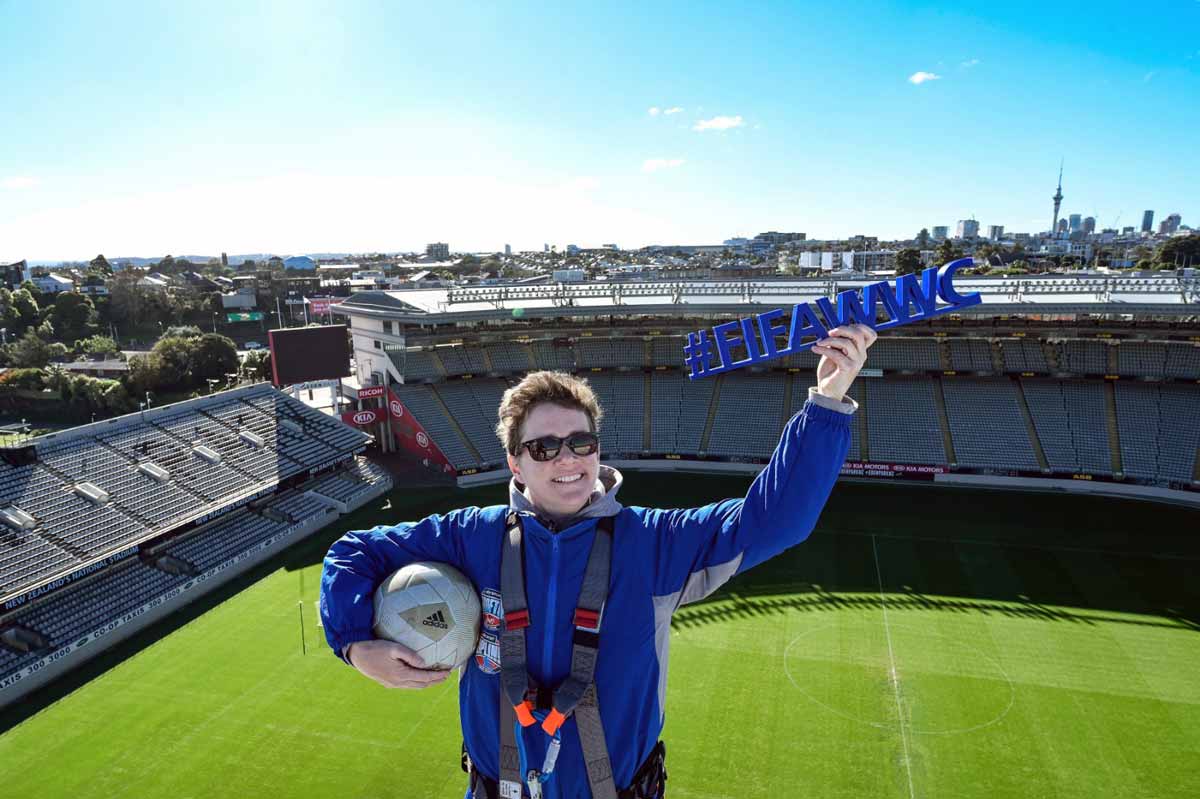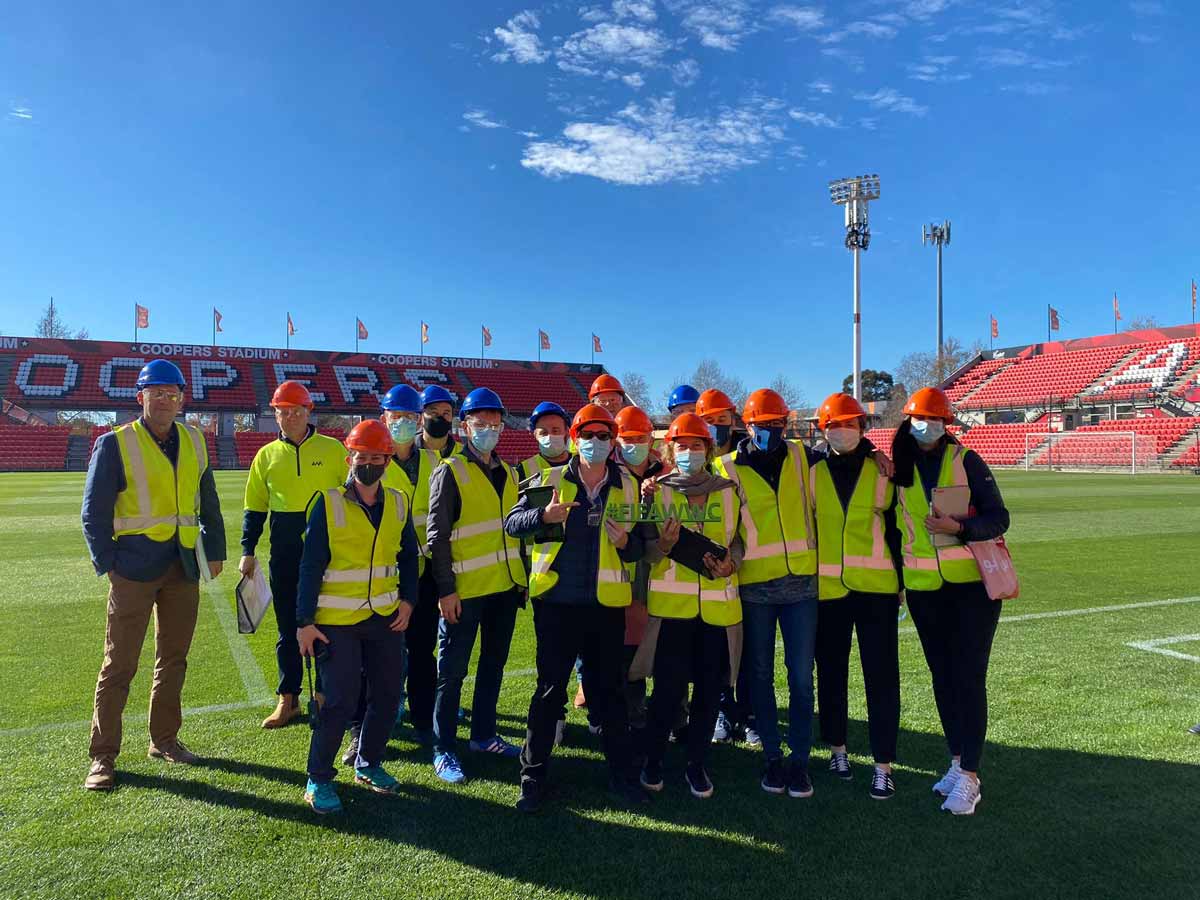
We spoke to Lee Davidson, a graduate of the Master in Sport Management Online and former FIFA safety and security manager, about her 11 years of experience in managing safety and security at sporting events
The strategic plan of any sporting event involves a department whose operations have a direct or indirect impact on all areas of management. It goes unnoticed, it is a silent actor, but its effectiveness depends on everything going according to plan. Lee Davidson, a recent graduate of our Master in Sport Management Online, has been responsible for safety and security management both working for the civil service – in her time at the UK Home Office as head of football – and for the private sector, including roles as safety and security lead for FIFA at a number of club and national team competitions. Lee, currently head of operations at the impressive Ageas Bowl cricket stadium, conveys a passion for her work and, needless to say, an absolute confidence in making the security and safety department of any sporting event a very important part of its success.
The 2019 FIFA Women’s World Cup in France registered an overall attendance of more than one million spectators in the nine stadiums that hosted the competition, with a 74.54% occupancy rate in the stands, 24 ‘sold-out’ matches, 395,000 spectators in the fan zones and more than 24,000 visitors to the exhibition on women’s football that was installed in Paris. The World Cup made headlines in the media for shattering all viewing records in the history of the FIFA Women’s World Cup. Equally important, the atmosphere in the stands and around the stadiums was also the seed that sparked the world’s interest in women’s football. Lee Davidson was FIFA’s safety and security manager for the tournament.

Lee, with the trophy.
“That was my biggest tournament working for FIFA, and the last one was the 2021 Club World Cup in Qatar, a completely different scenario because we were in the middle of Covid and had to manage what we called a ‘bubble tournament’,” Lee explains. Planning the safety & security operation for a whole series of FIFA World Cups at junior and senior level, stewarding duties at Lord’s Cricket Ground in London and supervising a team of security officers at the Commonwealth Games in Glasgow in 2014, spectator services for the 2015 Rugby World Cup in England, or duties as head of operations at the Ageas Bowl, where she is currently working, are just some of the roles that form part of her professional CV. Lee can now add to her list of qualifications the Master in Sport Management Online that has taught her to have a panoramic vision with which to perform her work more effectively.
We spoke with her about safety and security management at sporting events during her visit to the Johan Cruyff Institute headquarters in Barcelona on the occasion of her recent graduation from the master’s program.
Tell us about your experience as safety & security manager for FIFA.
I was responsible for the planning and delivery of the safety and security operation for a series of U-17, U-20 and senior World Cups. The most important tournament I was responsible for was the 2019 FIFA Women’s World Cup in France. It’s a really fascinating area because you are key and critical in every part of the event operation, the project managers relied heavily on my experience in helping them to plan. The last tournament I did with FIFA was the Club World Cup in Qatar in early 2021, a very different tournament because we were still under Covid restrictions and we had what was called a ‘bubble tournament’. So, there was a bubble for the players and everyone who worked around the dressing room areas, and then there was another group of us who dealt with the stadium management side, and we were never allowed to meet because if the players got sick, the tournament was over. It was very interesting.
From there, I went on to become head of safety and security at Southampton Football Club, where I worked last season, and then I switched to a wider role in stadium operations. I’m now working at the Ageas Bowl, which is Hampshire County Cricket Club’s ground, and the Southern Vipers, the women’s team. And we also organize England’s international matches, as well as other events like concerts and so on, which is new to me because I’ve always worked in sport and now I get to do some different things as well.
I’ve had a wide range of experience in different roles and it’s taken me to some very interesting places, especially with FIFA, working in the Korean Republic, in the Gulf states and India. As well as other tournaments in France and Uruguay.
So, were you part of the women’s football boom in 2019?
Yes, and it was absolutely incredible. I invited some friends to the quarterfinal match between France and the United States, and for that particular match, I was able to go with them to watch the game instead of working. And as we walked towards the stadium, the atmosphere grew and grew. My friends looked at me and said, “We had no idea a women’s football game could be like this.” And that’s what we’re seeing more and more. Last summer my country, Northern Ireland, qualified for the Women’s European Championship and they played all their games in Southampton, where I live. I was able to go to the stadium as a spectator and watch my national team. The atmosphere was incredible, the singing, the friendliness… We lost all our games, but we were there, we were part of it, we contributed to that tournament and really the atmosphere that it created, the buzz was amazing. And hopefully that’s something we’ll see more and more of, because for me, one of the things that motivates me and why I work in sport is to try to redress balance. And balance is really important in the work that I’ve been doing in security, you have to balance safety and security.
You have to balance the stadium infrastructure with the people who run them, the qualities and skills that they possess. Balance is very important in that sense, but I am also very motivated by the rebalancing in terms of gender equality in sport because both are equally important and have the same value.
What was it like managing safety & security during the Covid restrictions?
Well, it’s the stewards and security personnel who have the ultimate responsibility to keep the two bubbles separate. They’re the ones standing at the door saying “no, you can’t go through there because you don’t have the right accreditation”. It’s actually something that as security personnel, you have to do anyway, because you go to a tournament and there are areas that some people are not allowed to go into, like for example, if you don’t have a hospitality ticket, you can’t go in, you shouldn’t go into the dressing room area either. So that was another thing they had to do and I think giving them the ability to say “no” is really important. But, also, the key skill to have in safety and security, particularly on the front line, is communication. You have to explain to people that they can’t go there because they don’t have the right accreditation, and that we have to keep the bubbles separate in order to be able to hold the competition. There’s sort of a hierarchy of importance: first is the safety of everyone involved in the tournament, second is the sporting competition itself, and then come things like the commercial delivery of the event, sponsorship and marketing rights and everything else. But yes, safety comes first, and then the competition is the most important thing.
“When you have to restrict someone’s movements, the way you do it greatly influences on how they respond to it”
So, you’re saying that, in security,communication is one of those ‘soft skills’ that really make the difference…
Yes, a lot. I’ve done a lot of training of staff who work in crowd management and security and the question I ask them is: what do you think I’m looking for? And people say, ‘I have a security licence or I have experience’. Well no, the first thing I’m looking for is that you can communicate because if you have to restrict what someone is doing or direct them a certain way, the way you do it makes a big impact on how they respond to it. So, communication skills are the most important.

Calmness before a FIFA Women’s Worlc Cup match at Eden Park (Auckland).
What aspects should be taken into account in any security plan?
I think the first thing you have to remember is that everyone wants the same outcome, that people go to a stadium or any sporting event to have a good time. We cannot be responsible for what happens on the pitch or on the court. We are not responsible for that, but we are responsible for making sure everyone is safe so they can have a good time. And if you put that at the centre of what you do and make that the basis of that, then you treat people the right way and they respond the right way. One of the challenges around safety is that people ask you about the importance of certain things you do. Why is it important if that has never happened? The stands have never collapsed, we’ve never had riots here, never had crowds out of control.’ Right, because we have to do things to make sure that doesn’t happen. Everything goes well until it doesn’t. And then you have a big problem. So, it’s about putting in place preventive measures to create a safe environment, to create an environment where people feel welcome. From there, you have their collaboration.
“It’s about putting preventive measures in place to create a safe environment, to create an environment where people feel welcome. From there, you have their collaboration”
What technological solutions have been implemented in terms of security that we could no longer survive without today?
It’s an interesting question because, actually, you can you can do it very low tech if you want, but there are many tools that make things easier, such as devices for searching people coming into stadiums, whether that’s walkthrough search arches, x-ray machines that you see at the biggest sort of tournaments like the Olympics, the men’s and the women’s World Cup in football, but also at other tournaments as well in areas like accreditation and electronic access control. These kinds of things are really important. We can search you without any sort of equipment, we know how to do it manually, but it is much easier if I have a magnetic wand that may not detect everything, but it is quicker. To maintain security and keep people safe, you have to avoid bottlenecks, that people do not accumulate, that there is a flow of people. So, making use of those technologies is really beneficial.
Has Covid accelerated the search for solutions in terms of safety & security?
Well, I think a lot of technologies were in place beforehand, but everything related to thermal scanning, heat scanning, and the development of technologies to speed up the flow of people and avoid crowd congestion was really important. You suddenly had to think about finding solutions in an environment where interactions between people are suddenly more challenging.
“Technology was already in use before Covid, but everything related to thermal scanning and the development of technologies to speed up the flow of people and avoid crowd congestion was really important”
What do you love most about your job?
I am very fortunate. I work with a great team of people who are really committed and excited about what we deliver for people coming into the stadium. Because one of the nicest things about working in sport is that people take a lot of pride in what they do and are very committed. You have to be because it’s not easy to work in sport, so you have to be committed. And I think that passion, if you work in a stadium like I do, the passion for the environment and everything around it, is something that really shines out.

Lee poses with her team after the inspection of the stadium in Adelaide.
There are teams on the pitch, but there’s also a team behind the scenes. And I love being part of that team behind the scenes, because that’s when people come to the stadium and enjoy themselves, regardless of what happens on the pitch. They leave and they can say: ‘I still had a good time. We didn’t win tonight but you know what, we had a great time. There was a great atmosphere, the bathrooms were clean, I was able to buy a hamburger, the stewards helped me when I couldn’t find my seat.’ That kind of thing. We’re all part of that and I work with a team of very passionate and committed people to make those things happen. And that’s what I really like about working in sport.
“My experience in the Master in Sport Management Online has been fantastic because you learn about the whole breadth of the sports business”
What has your experience on the Master in Sport Management Online been like?
It’s been fantastic because you learn about the whole breadth of the sports business. I didn’t know much about marketing or sponsorship or things like that before, but I was able to put it in the context of the work I was doing. I get to work with marketing teams and now I understand their perspective on things a little bit better, and that makes me think about them when I’m planning. If I do that, how does it impact the marketing team? There are departments that you work very closely with, like ticketing, you see things more broadly. How does that impact the legal team and the contracts that they do? Or everything we do. I think understanding the business of sport more broadly would have been really helpful in my previous jobs, if I look back, but also in everything I do in the future. It’s not just useful now, but looking forward to my next steps in the sports industry.






